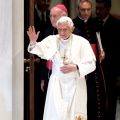Submission, not power, raises people up to God, says Pope at audience
VATICAN CITY - Christians find fulfillment not by using power or force to realize their own wishes, but by being submissive to God's will and serving others, Pope Benedict XVI said.
Many in the world today are surrounded by people or things that threaten to become the guiding force in their lives, therefore, "it's necessary to have a hierarchy of values in which the top priority is God," the pope said during his weekly general audience in the Paul VI hall June 27.
It was his last general audience before the pope was to leave July 3 for vacation at the papal summer residence in Castel Gandolfo, south of Rome. The weekly general audience was scheduled to resume Aug. 1.
Of holiness and finesse
A woman had a problem. Her parents arranged for her to marry. She knew it wasn’t the life she wanted; she had things to do, which didn’t involve marriage. What to do? Unable to disobey her parents, she was caught between duty and desire. She got engaged.
Before they could be married, her betrothed died in an accident.
The woman, Macrina, lived when it was difficult for a young woman to oppose her parents or to remain unmarried. They would certainly make a new marriage arrangement for her. Still, she had a desire to live her life another way.
Walking in God’s way solves our woes
14th Sunday in Ordinary Time (Year B) July 8 (Ezekiel 2:3-5; Psalm 123; 2 Corinthians 12:7-10; Mark 6:1-6)
Few people could have handled Ezekiel’s encounter with God and the realm of the spirit — or would have even wanted to. Ezekiel lived among the exiles in Babylon in the mid-sixth century BC. As he sat by the Chebar River — rivers play an important role in the lives of prophets and visionaries — he had a terrifying vision of the heavens. If this were not enough, a spirit soon entered him and began to speak and to charge him with an important mission.
Mystically driven life
Mysticism is an exotic word. Few of us connect mysticism with ordinary experience, especially with our own experience. Mysticism is generally seen as an exotic thing, a paranormal thing, a special kind of consciousness given only to the most elite within the spiritual life.
But mysticism isn’t extraordinary, paranormal or weird, but an important, ordinary experience.
British Carmelite Ruth Burrows defines mysticism this way: Mysticism is being touched by God in a way that is deeper than language, thought, imagination and feeling. It’s knowing God and ourselves beyond explicit thought and feeling.
Pope tells homeless, jobless quake victims to put trust in God
ROVERETO DI NOVI, Italy - Fear and anxiety are natural responses to the terror and destruction wrought by a natural disaster, but God's love is rock solid, providing certainty and solace for all victims, Pope Benedict XVI said.
"Upon this rock, with this firm hope, one can build and one can rebuild," he said to more than 2,000 Rovereto di Novi residents -- many of whom were rendered homeless and jobless by two earthquakes in May.
"Remain true to your vocation as fraternal and supportive people, and tackle everything with patience and determination, fighting the temptations that unfortunately come with these moments of weakness and need," he said June 26.
Vatican faces 'urgent' need for priests with new vocations guidelines
VATICAN CITY - In an effort to respond to a "clear and pressing" need for priests, the Vatican released a set of guidelines to help bishops and church communities promote, recruit and educate a new generation of men for the priesthood.
The church needs "suitable" candidates and must avoid men who "show signs of being profoundly fragile personalities," while helping others heal from any possible "individual deviations" from their vocations, the document said.
Pope: Revitalized faith can help Catholics avoid evangelical movements
VATICAN CITY - The increasing number of Pentecostal and evangelical communities in Latin America cannot be ignored or taken too lightly, Pope Benedict XVI told bishops from Colombia.
Catholics are "called to purify and revitalize their faith" as well as strengthen pastoral programs to improve formation and help people feel welcome in the church, he said.
The Pope made the remarks in a talk June 22 to a group of Colombian bishops making their "ad limina" visits to the Vatican to report on the status of their dioceses and hold discussions with Vatican officials.
At audience, Pope appeals for peace in Nigeria, talks about prayer
VATICAN CITY - Expressing his "deep concern" about terrorist violence in Nigeria, Pope Benedict XVI urged an end to "the shedding of the blood of so many innocent people."
Speaking at the end of his weekly general audience June 20, the Pope said the terrorist attacks are continuing and are "directed mostly against Christian faithful."
For months, bombs have exploded at Christian churches in various cities; the attacks were carried out on Sunday mornings when the churches were full. Forty-five people were reported killed June 17 after four churches in Zaria and Kaduna were bombed, and mobs carried out reprisal attacks on Muslims.
Vatican II's Bible promotion said to create vitality in church life
NEW YORK - In the 50 years since the Second Vatican Council encouraged Catholics to read, reflect and act on Scripture, there has been a "surging vitality in the life of the church," according to Cardinal Peter Turkson, president of the Pontifical Council for Justice and Peace.
"There is nothing that the church does that is not rooted in Scripture," he told participants at the New York Catholic Bible Summit June 16.
The Father is a God of the living
13th Sunday in Ordinary Time (Year B) July 1 (Wisdom 1:13-15; 2:23-24; Psalm 30; 2 Corinthians 8:7, 9, 13-15; Mark 5:21-43)
Since the beginning of time humans have experienced death as a relentless and merciless hunter. Death is a primal fear that is always lurking in the background of human consciousness. Even with modern so-called sophistication, people deny the inevitability of death in various ways: outright denial, endless expensive treatments and therapies to retain the illusion of youth or technological “solutions” such as cryogenics. In the end, however, the morality rate is 100 per cent — no one gets through life alive!
Moving beyond our bad habits
We all have our faults, weaknesses, places where we short-circuit morally, dark spots, secret and not-so-secret addictions. When we’re honest, we know how universally true are St. Paul’s words when he writes: “The good thing I want to do, I never do; the evil thing that I do not want to do — that is what I do.” None of us are whole, saints through and through. There’s always something we are struggling with: anger, bitterness, vengefulness, selfishness, laziness or lack of self-control (major or minor) with sex, food, drink or entertainment.








